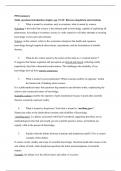PSM summary
Study questions Introduction chapter, pp. 15-18 / Between skepticism and scientism
1. What is meant by scientism, and, in scientism, what is meant by science.
Scientism is the belief that science is the ultimate path to knowledge, capable of explaining all
phenomena. According to scientism, science is vastly superior to all other attempts at securing
knowledge: its laws provide certainty.
Science, in this context, refers to the systematic enterprise that builds and organizes
knowledge through empirical observations, experiments, and the formulation of testable
theories.
2. What do the writers mean by the notion of the mind as a “crooked mirror”?
It suggests that human cognition and perception are flawed and biased, reflecting reality
imperfectly, thus like a distorted/crooked mirror. This challenges the reliability of our
knowledge derived from sensory experience.
3. What is meant by post-modernism? Which concept could be its opposite ‘within
the framework of thinking about science.
It is a philosophical stance that questions big narratives and absolute truths, emphasizing the
relative and constructed nature of knowledge.
Scientific realism could be the opposite of post-modernism because it posits that scientific
theories accurately represent reality.
4. What is meant by skepticism? And what is meant by ‘anything goes’?
Skepticism refers to the doubt about certainty and reliability of knowledge.
‘Anything goes’ is a phrase associated with Paul Feyerabend, suggesting that there are no
methodological rules that universally govern scientific practice; hence, all methods are
equally valid in the pursuit of knowledge.
5. Explain what the debate between scientism and skepticism entails? Give a current
example of this debate.
It centers on the validity and scope of scientific knowledge. Scientism holds that science is the
sole arbiter of truth, while skepticism questions the limits and assumptions of scientific
inquiry.
Example: the debate over the effectiveness and safety of vaccines.
, 6. Which questions are the most important in this book, according to the authors?
The authors highlight questions concerning the nature of scientific knowledge, the methods of
acquiring it, the reliability of scientific theories, and the role of philosophy in science as the
most critical.
7. What do the writers of the book mean by the title: ‘Exploring humans’?
It reflects the book’s aim to investigate the nature of human beings through the lens of
philosophy of science, focusing on how we understand ourselves and the world scientifically
and philosophically.
8. The book consists of three parts; what are these, and what are they about?
Summarize each part in a sentence.
Part 1: Philosophy of Knowledge – examines historical and contemporary views on what
knowledge is and how it is acquired.
Part 2: Philosophy of Science – Discusses the principles, methods, and implications of
scientific inquiry.
Part 3: New Perspectives – Explores modern developments and debates in the philosophy of
science, integrating perspectives from various disciplines.
Ppt notes
Types of skepticism
- Philosophical: doubting the possibility of knowledge
- Voltairean: doubt about institutions
- Scientific: treat all knowledge/evidence with reasonable doubt until convinced of its
worth (critical thinking about science)
- Dogmatic: doubting all knowledge; knowledge is always impossible
- Nihilistic: knowledge is always impossible and therefore we must not act (nihilism=
everything is meaningless)
Feyerabend says that in science a carnival of approaches should be allowed; others disagree.
Conclusion of the Introduction chapter: Two opposite philosophical positions on science:
scientism (science produces certainty) and skepticism (science does not produce certainty and
, we should doubt the possibility of knowledge). Both positions are not feasible for social
sciences like communication science. We are looking for a position between them.
Study questions Chapter 1, pp. 23-43 / Rationalism & Empiricism in Antiquity
1. What is meant with the ‘correspondence theory of truth’?
This theory holds that a statement is true if it corresponds to a fact or reality. For a belief to
possibly constitute knowledge the belief must at least be true.
2. Explain what is meant with the following sentence: “However, although a belief must
be true in order to qualify as knowledge, its truth is not sufficient for that believe to
qualify as knowledge” (p. 24).
It means that for a belief to qualify as knowledge, it must not only be true, but also justified
and held for the right reasons. Simply being true is not enough if the belief is based on
incorrect or irrational grouds.
3. What is meant by epistemology and ontology?
Epistemology: the study of knowledge, its nature, sources, and limits
Ontology: the study of being, existence, and the nature of reality
4. Why can Plato be seen as a rationalist and Aristotle as an empiricist?
Plato can be seen as rationalist because he emphasizes the role of reason and innate ideas.
Aristotle can be seen as an empiricist because he stresses the importance of sensory
experience in acquiring knowledge.
5. Why can Aristotle also be seen as a rationalist?
Despite his empiricism, Aristotle can also be viewed as a rationalist due to his belief in the
logical structuring of knowledge and the use of reason to understand the principles underlying
empirical observations.
6. What does the Socratic method entail?
He describes this method of Q&A as intellectual midwifery, as its main objective is to assist
others in their philosophizing by asking questions in order to give birth to true ideas and to
stimulate critical thinking. He often claimed that his not knowing was his only certainty.





